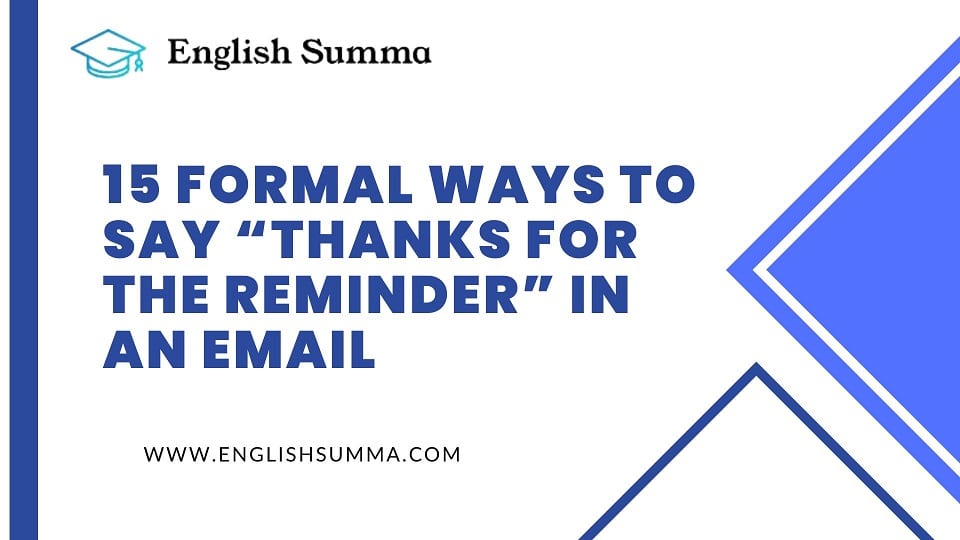In the fast-paced world of business communication, expressing gratitude in a formal and appreciative manner is essential. Acknowledging reminders is a courteous and professional way to maintain effective collaboration. In this article, we will explore seven formal ways to say “Thanks for the Reminder” in an email, providing scenario examples for each expression.
Is Expressing Gratitude with “Thanks for the Reminder” Considered Formal?
Yes, saying “Thanks for the Reminder” is generally considered formal in professional communication. This expression combines a polite acknowledgment with an expression of gratitude, maintaining a courteous and respectful tone. It reflects professionalism by acknowledging the effort and consideration of the person providing the reminder. However, if you wish to add more formality or variation to your expression of thanks, the article above provides several alternative phrases that can be used in various professional contexts.
Now it’s time to learn Formal Ways to Say “Thanks for the Reminder” in an Email.
1. Appreciate the Heads-Up
Begin your email with a tone of gratitude by expressing appreciation for the advance notice or reminder. This phrase communicates that you value the timely information provided.
Example:
Dear Mr. Johnson,
I wanted to take a moment to appreciate the heads-up regarding the upcoming project deadline. Your timely reminder allows me to ensure that all necessary preparations are in place.
Best regards,
[Your Name]
2. Thank You for Bringing This to My Attention
This phrase conveys appreciation for the reminder, emphasizing the importance of the information presented. It’s a formal way to express gratitude for someone helping you stay on top of crucial details.
Example:
Hello Jennifer,
I would like to extend my sincere thanks to you for bringing this to my attention. Your reminder regarding the client meeting tomorrow is invaluable, and I am grateful for your diligence.
Regards,
[Your Name]
You would love to learn Other Ways to Say “Have a Good Rest of Your Day”
3. Grateful for the Reminder
A straightforward expression of gratitude, this phrase demonstrates a humble acknowledgment of the assistance provided. It maintains a professional tone while clearly conveying appreciation.
Example:
Dear Mrs. Martinez,
I am truly grateful for the reminder about the conference call scheduled for 2:00 PM. Your proactive approach helps ensure that I stay organized and on schedule.
Sincerely,
[Your Name]
4. Your Prompt Notification is Much Appreciated
This phrase adds a touch of formality by recognizing the promptness of the reminder. It conveys gratitude for the efficiency with which the information was delivered.
Example:
Hi David,
I wanted to express how much I appreciate your prompt notification. Your prompt notification is much appreciated, and it allows me to address the matter promptly and efficiently.
Best regards,
[Your Name]
5. I am Thankful for Your Reminder
Using the word “thankful” elevates the level of gratitude, indicating a deeper appreciation. This phrase is suitable for situations where the reminder has significant implications or consequences.
Example:
Dear Sarah,
Please allow me to express how thankful I am for your reminder regarding the budget review. Your attention to detail ensures that we stay on track with our financial goals.
Best regards,
[Your Name]
6. Expressing My Appreciation for the Timely Reminder
By explicitly mentioning the timeliness of the reminder, this phrase emphasizes the importance of receiving the information at the right moment. It conveys gratitude while highlighting the significance of the timing.
Example:
Hello Mr. Anderson,
I am writing to express my appreciation for the timely reminder about the team meeting tomorrow. Expressing my appreciation for the timely reminder, I am confident that the meeting will be productive and well-prepared.
Sincerely,
[Your Name]
7. Thank You for Keeping Me Informed
This phrase goes beyond a mere reminder, acknowledging the broader value of being consistently informed. It’s suitable for situations where ongoing communication is crucial.
Example:
Dear Alex,
I wanted to take a moment to thank you for keeping me informed about the project updates. Your reminders play a vital role in ensuring that I am aware of the latest developments and can contribute effectively.
Regards,
[Your Name]
8. Your Reminder is Invaluable
This expression emphasizes the importance of the reminder, indicating that the information provided is highly valuable. It’s suitable for situations where the reminder significantly impacts the recipient’s work or schedule.
Example:
Dear Ms. Parker,
I want to convey my gratitude as your reminder is invaluable. It helps me prioritize tasks effectively, ensuring that nothing crucial slips through the cracks.
Best regards,
[Your Name]
9. I Appreciate Your Thoughtful Reminder
Adding the adjective “thoughtful” conveys a sense of consideration and care in the reminder. This phrase is apt for situations where the reminder reflects the sender’s attentiveness to your responsibilities.
Example:
Hello Chris,
I appreciate your thoughtful reminder about the client presentation. Your attention to detail is evident, and it makes working together a seamless experience.
Regards,
[Your Name]
10. Thank You for the Timely Nudge
This expression adds a touch of informality while maintaining professionalism. It is suitable for situations where the reminder serves as a gentle nudge to ensure tasks are completed promptly.
Example:
Hi Emily,
Thank you for the timely nudge regarding the project update. Your proactive approach is instrumental in maintaining project timelines.
Sincerely,
[Your Name]
11. I Extend My Gratitude for Your Reminder
Using the phrase “extend my gratitude” elevates the formality, making it suitable for more formal or corporate settings. It communicates a sense of formality while expressing thanks.
Example:
Dear Mr. Turner,
As we approach the deadline, I extend my gratitude for your reminder. Your commitment to our shared goals is truly commendable.
Best regards,
[Your Name]
12. Your Reminder is a Welcome Prompt
This expression conveys not just gratitude but also a positive acknowledgment of the reminder as a welcome prompt. It’s suitable for situations where the reminder helps in initiating a task or action.
Example:
Hello Olivia,
I wanted to let you know that your reminder is a welcome prompt for the upcoming team training. It ensures that I stay on track with my preparations.
Regards,
[Your Name]
13. I Am Indebted to You for the Reminder
This phrase adds a touch of formality by using the term “indebted,” indicating a deep sense of gratitude. It’s suitable for situations where the reminder plays a critical role in preventing potential issues.
Example:
Dear Mr. Davis,
I must express how deeply I am indebted to you for the reminder regarding the contract review. Your proactive approach safeguards our interests, and I am truly thankful.
Sincerely,
[Your Name]
14. Your Reminder Is a Testament to Your Diligence
This expression not only conveys gratitude but also recognizes the sender’s diligence in providing reminders. It’s suitable for situations where consistent reminders reflect the sender’s commitment to collaboration.
Example:
Hi Michelle,
I want to acknowledge that your reminder is a testament to your diligence. Your commitment to maintaining clear communication is evident and appreciated.
Best regards,
[Your Name]
15. I Am Grateful for Your Proactive Reminder
Adding the term “proactive” emphasizes the sender’s initiative in providing the reminder. This phrase is suitable for situations where the reminder reflects the sender’s forward-thinking approach.
Example:
Dear Alex,
I am grateful for your proactive reminder about the upcoming project milestone. Your foresight ensures that we stay ahead of potential challenges.
Regards,
[Your Name]
In conclusion, expressing gratitude in professional emails is a subtle yet impactful aspect of effective communication. Using these formal phrases not only conveys appreciation but also fosters a positive and collaborative work environment. Tailoring your expressions of thanks to the context and significance of the reminder will contribute to building strong professional relationships.

Emily Hudson, the creative mind behind “English Summa,” is a passionate English language educator with a Bachelor’s Degree in English and a Teaching Certification. Dedicated to making the intricacies of English accessible to learners, Emily brings a blend of expertise and enthusiasm to her readers. Follow English Summa for insightful language tips, literary explorations, and a shared love for the beauty of English.

